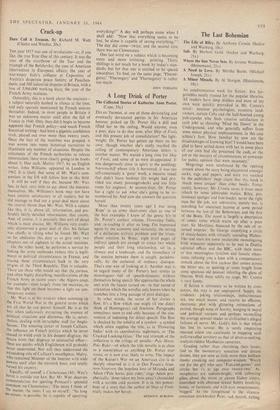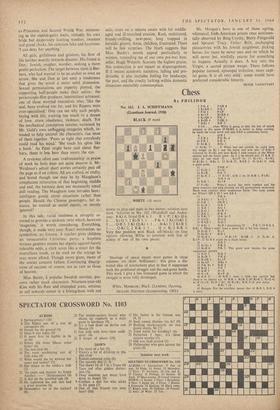. The Last Bohemian The Life of Riley. By Anthony
Cronin. (Seeker and Warburg, I8s.) Where the Sun Never Sets. By Jerome Weidman. (Heinemann*, 21s.) AN unadventurous week for fiction: five for- gettables neatly trussed for the popular libraries. All readers 'have deep dislikes and most of my own were quickly provoked in Mr. Cronin's novel: amateur psychologists, eccentric land- owners, outsize Celts and the half-hearted young pub-crawler who finds creative satisfaction in such jobs as shouting `Mind the Doors' in the Underground, and who generally suffers from some minor physical unpleasantness, in this case athlete's foot. How familiar by now are the disadvantages of knowing him! 'I would have been glad to have settled down with her in some place of our own had she possessed the cash, or the job or the mastery of circumstances, or contempt for public opinion that were necessary.'
Misgivings were reinforced by the opening remark about the story being discovered amongst socks, rags and papers, and were not soothed by the publishers' inept claim that thi, book is `much more unique' than other books. Fortu- nately, however, Mr. Cronin saves it from mere rehash by some admirable malice. Riley, pro- fessional sponger and free-loader, never the right ,inan for the job, not subversive, merely wet, is searching for unearned income at some period between the last of the Bohemians and the first of the Beats. The novel is largely a description of comic turns which warm up after a poor start. Sir Mortlake, financed by the sale of re- turned empties: Sir George stupefying a circle of music-haters with virtually unending Mahler. The real stars are some intolerable monologuing Irish wiseacres apparently to be met in Dublin editorial offices and the BBC, with their more or less meaningless lyricism and lunatic obses- sions, refusing you a loan with a compensatory remark about the first cuckoo that comes across the bitter sea, or quoting at some length from some spurious old peasant infesting the glens of Ontrim. With these safely on stage, Mr. Cronin is very funny.
If fiction is ultimately to be written by com- puters, the way is not unprepared. Supply the evidence,: joking relationships, indiscriminate sex, too much booze, and receive an efficient, electronic plot with glittering intimations of period, though none of history, hanging in moral and political vacuum and perhaps reconciling the average sensual reader to civilisation's alleged failures of nerve. Mr. Gold's Salt is that which has lost its savour. He is surely employing unusual talent too cautiously in mapping such well-travelled territory as that of divorce-seeking, analysis-ridden Manhattan careerists.
Grading rather than cherishing their lovers, tied to the momentary sengation and distant dream, they are seen as little more than brilliant masks croaking out computer-wisdom. 'Watch out for the girl who says "Fun-and-games" and circles her i's at age over twenty-two. At- mospherics are sodium-bright, with yellowing gibes, about the seven or eleven Gabor sisters, nourished with abstruse sexual habits involving honey, or furniture, and with eyes monotonously 'bugged.' In the foreground is the vitamin- conscious stockbroker Peter. sad. boyish, failing, ex-Princeton and Second World War, minister- ing to the capital-gains waifs, virtually his own bride but desperately hunting woofers, tweeters and grand chicks, his cynicism fake and facetious. '1 can deny her anything.'
All girls, girlishness and girldom, his flow of life lurches wearily towards disaster. His friend is Dan: Jewish, tougher, wordier, seeking a more gentle perfection. The target between them is Bar- bara, who had wanted to be an archer or even an arrow. She and Dan at last emit a tenderness that gives the novel a more solid dimension. Sexual permutations are expertly plotted, the supporting half-people make their antics : the pornoscopic-film producer, intermittent actresses; one of those worried executives who, `like the seal, have evolved too far, and his flippers were over-specialised.' One can see why such people, toying with life, trusting too much to a dream of love, crave obedience, violence, death. Yet the mechanical conception returns, sustained by Mr. Gold's own unflagging imageries which, in- tended to help unravel the characters, run most of them together. `Pants so tight that everybody could read his mind.' She reads his spine like a book.' As Peter might have said about Bar- bara, there is less here than meets the eye.
A reviewer often uses 'craftsmanship' in praise of work he feels does not quite deserve it. Mr. Weidman's adroit short stories certainly peel off the page as if on rollers. All are crafted, or crafty, and bored though one may be by Maugham's complacent reiteration of that beginning, middle and end, the formula does not necessarily entail dull reading. The Maugham tone intrudes here: intelligent gossip about situations rather than people. Should the Chinese passengers, for in- stance, be treated as social equals, or merely ignored?
In this tale, racial nastiness is abruptly re- versed to provide a sardonic twist which, however 'magazine,' is worth considering. Everything, though, is made very easy. Exact motivation, no symbolism, no fantasy. A teacher gives children an unsuccessful Christmas party, a hopeless woman gambler retains her dignity against barely tolerable odds, a clerk saves like a miser for the marvellous trunk, to be used on the voyage he may never afford. Though never glum, many of the stories concern failure. Convincing derip- tions of success, of course, are as rare as those of heaven.
Miss Buren, a popular Swedish novelist, pre- sents rather stock characters. Nineteen-year-old Kim with his flute and crumpled jeans, anxious to sail towards sunset in a fishing-boat with red sails, stays on a remote estate with his middle- aged and ill-matched cousins, Raol, embittered, brandy-swilling, new-poor, long trapped in heraldic gloom; Anna, childless, frustrated. There will be few surprises. The blurb suggests that Miss Buren's novels appeal particularly to women, reminding me of our own pre-war best- seller, Hugh Walpole. Scarcely the highest praise, this connection is not meant as disparagement. If it means academic narrative, lulling and pre- dictable, it also includes feeling for landscape, the past, and the cruelty lurking within domestic situations ostensibly commonplace.
Mr. Morgan's hero is one of those ageing, whimsical, Irish-American priests once sentimen- tally observed by Bing Crosby, Barry Fitzgerald and Spencer Tracy. Father Britt, exchanging pleasantries with his Jewish neighbour, picking horses for races he never sees and on which he will never bet, wistfully yearns for something to happen. Actually it does. A boy sees the Virgin, a sacred picture weeps. There follows popular turmoil, episcopal irritation, more capi- tal gains. It is all very mild: some would have preferred considerable ferocity.
PETER VANSITTART







































 Previous page
Previous page